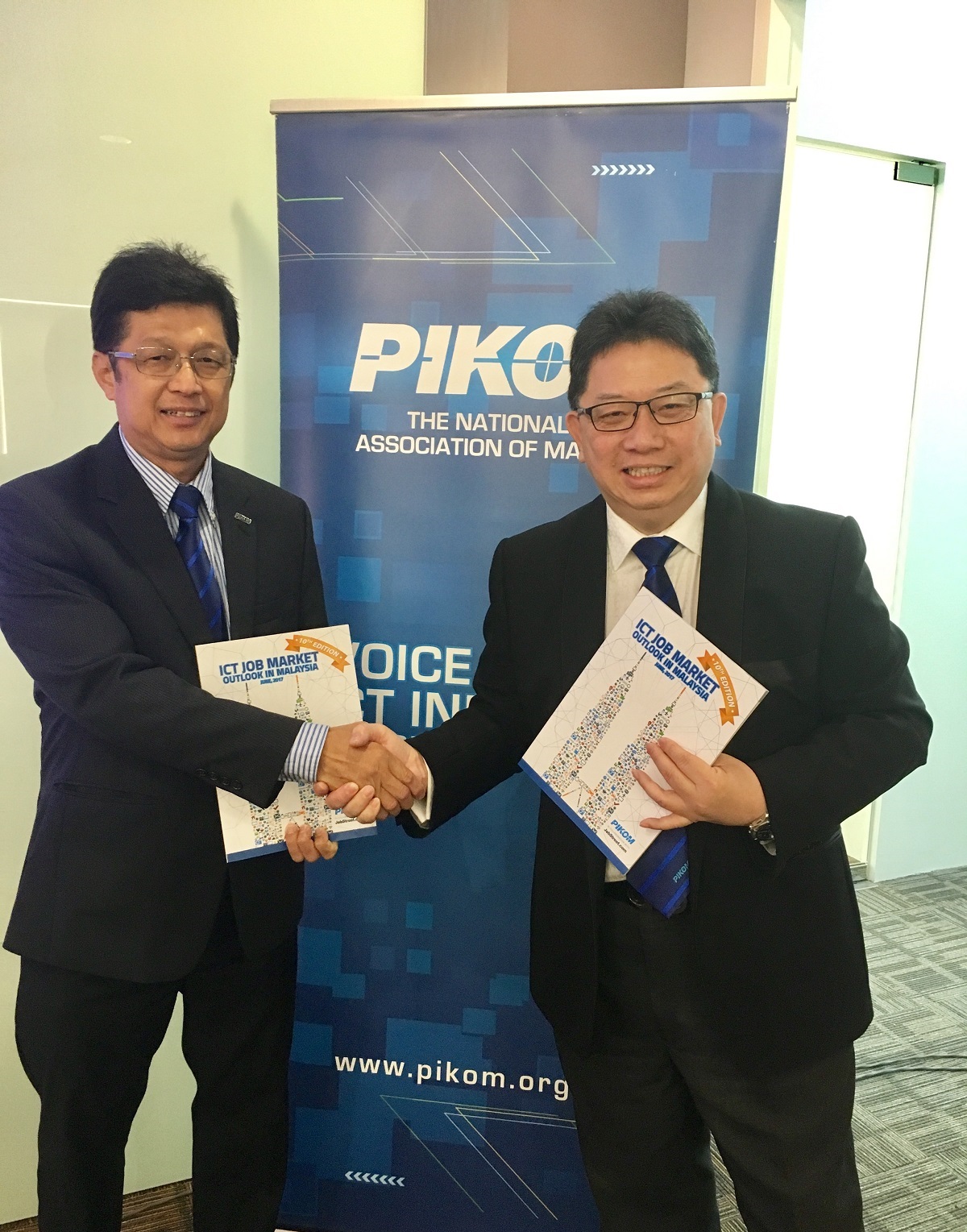These findings and much more, can be found in PIKOM’s ICT JOB MARKET OUTLOOK IN MALAYSIA 2017 report, launched today at PIKOM’s premises.
In 2016, IT Project Managers in Malaysia earned much more than their counterparts in the Philippines and India but much less than their counterparts in Hong Kong, United Arab Emirates and United States.
Once again, PIKOM embarked on this project in collaboration with Jobstreet.com, a leading online job board presently covering the employment markets in Malaysia, Singapore, Philippines, Indonesia and Vietnam.
In this report, PIKOM made estimates and performed trend analysis on the data provided by Jobstreet.com which is based on the job postings by employers looking for professionals to fill their IT job positions. PIKOM tracked the average salaries of ICT Professionals in five job categories in 22 industries.

This indispensable guide, now in its 10th edition is aimed at helping decision makers in organisations, to understand and plan their ICT talent requirements and acquisitions.
The report also discusses the state of the ICT industry in Malaysia. PIKOM projects that the total ICT contribution to the GDP in Malaysia would grow from RM152.1 billion in 2015 to about RM164 billion in 2016, which is more than four times the value in 2007. This projection is calculated on the basis of ICT contribution to GDP’s Average Annual Growth Rate (AAGR) of 7.6% for the period 2010-2015.
PIKOM also projected the overall share of the ICT industry to the economy in 2016 would be about 18.2% from 17.8% in 2015. The main driver of the ICT industry growth continues to be ICT Services which PIKOM projected would have grown to about RM67 billion in 2016 from RM61.4 billion in 2015.
“During the first half of this year, we have also witnessed many ICT developments that will have significant impact on the growth and success of the industry,” said PIKOM chairman Chin Chee Seong, at the launch of the ICT Job Market Outlook in Malaysia 2017 report today.
These developments, he said, included the launch of the Digital Free Trade Zone which will complement PIKOM’s E-Commerce chapter, launched earlier this year.
Chin also added that PIKOM is cautiously optimistic that the economy will improve further this year based on the year-on-year GDP growth of 5.6% in the first quarter of 2017.
“We are revising our earlier projection of 4% for the GDP growth in 2017 to 5% based on improved performance in the domestic demand sector and in most economic sectors,” he added.
In terms of the job market in the ICT industry, the salaries of fresh graduates, junior executives, senior executives, middle level managers and senior managers rose in 2016 although the growth rate in most categories was lower than expected (Table 1).
The salary trends of the entry level professionals are also a cause for concern as the salary gap between this category and the other four categories especially the senior manager category, continued to widen.

“The entry level professionals were the hardest hit with a growth rate of only 3.7% in 2016 compared with 5.3% in 2015 and the widening gap is an ongoing concern,” said PIKOM Research Committee chair Woon Tai Hai.
In 2016, the salary of a senior manager was 6.44 times more than the salary of an entry level ICT professional and the gap is expected to be higher at 6.61 in 2017 (Table 2).
Some of the top paying industries in 2016 included Automotive/Heavy Industry/Machinery industry paying the highest for ICT Professionals at an average monthly salary of RM8,952. This was followed by the Call Centre/IT enabled Services/BPO industry at RM8,822; Transport/Storage/Freight/Shipping at RM8,791; Science & Technology/Aerospace/Biotechnology at RM8,760 and Computer/IT (hardware) at RM8,397.

“Overall our ICT Professionals have been able to command relatively steady and high salaries not just due to their set of specific skills, experience and knowledge, but that the industry has also kept up the pace with the evolutions and revolutions of information technology. Albeit the ups and downs on the year-on-year of the average salary growth, the local trend is still on the upside” said Woon.
The Purchasing Power Parity Adjusted Criterion benchmarking scale also showed that the salary of an IT Project Manager in Hong Kong, United Arab Emirates, Australia, Saudi Arabia and United States was 1.8, 1.55, 1.46, 1.38 and 1.3 times more respectively than the IT Project Manager in Malaysia. (The Purchasing Power Parity Adjusted Criterion benchmarking scale takes into account inflation rates and fluctuations in the foreign exchange).
Malaysia is currently sitting at the 7th spot in the PPP Adjusted Criterion benchmarking scales when comparing the salary of an IT Project Manager in the most advanced career level (late) among 15 countries.
“Although Malaysia is higher than some of the developed countries in the world, we are still only at the halfway point in this scale and threat of brain drain is still there”, added Woon.
In this year’s report, PIKOM has also introduced a section on the hiring trends of ICT Professional which is based on the count of job postings for each of the five categories in the 22 industries tracked in this report (sourced from Jobstreet.com).
The hiring trends showed that there were 11,227 job openings for ICT Professionals in 2016, of which Computer/IT (Software) industry offered about a third of the number. Almost 80 per cent of the job openings were available for ICT professionals in the Junior Executive and Senior Executive job categories.
However, the number of job openings in 2016 was a drop of almost 40 per cent in comparison to the 18,249 jobs offered in 2015. The entry level job category experienced the biggest decrease at almost 60 per cent.
“Given a low year-on-year growth between 2015 and 2016, these findings are to be expected. The challenging economic climate in 2016 has certainly influenced the hiring decisions for ICT professionals,” Woon further added.
PIKOM would like to express their gratitude to Jobstreet.com for once again collaborating with us on this important report. “We would like to also thank Bank Negara Malaysia, Department of Statistics Malaysia, International Labour Organization, Payscale, World Bank, United Nations and AT Kearney for their valuable data which have enhanced the content of this publication,” said Chin.
“We would also like to express our deepest appreciation to our sponsors, BDO, Fusionex, Epson, Glocomp, EK Tech, Iverson (a partner of Microsoft), Dell EMC , Hitachi Sunway and Powerware Systems for their support towards the success of this report,” he added.
About PIKOM
PIKOM, THE NATIONAL ICT ASSOCIATION OF MALAYSIA is the association representing the information and communications technology (ICT) industry in Malaysia. Its membership currently stands close to 900 comprising companies involved in a whole spectrum of ICT products and services which commands about 80% of the total ICT trade in Malaysia. PIKOM works to improve the business climate in the interests of all its member companies and to promote industry growth in line with national aspirations. PIKOM’s membership is open to all Malaysian companies who supply ICT products and services in the computing and telecommunications industries. However, non-ICT companies are also welcome to join the Association as associate members.








